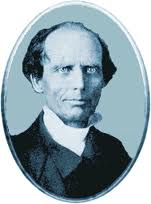 Charles Finney had a lot to say about the effective means of communicating a message, particularly the most important message of all—the Gospel. He was continually criticized by other ministers for using plain language in his messages; he should show off his learning with superb rhetoric, they argued. Finney argued back in this way in his autobiography:
Charles Finney had a lot to say about the effective means of communicating a message, particularly the most important message of all—the Gospel. He was continually criticized by other ministers for using plain language in his messages; he should show off his learning with superb rhetoric, they argued. Finney argued back in this way in his autobiography:
The captain of a fire company, when a city is on fire, does not read to his company an essay, or exhibit a fine specimen of rhetoric when he shouts to them and directs their movements. It is a question of urgency, and he intends that every word shall be understood. He is entirely in earnest with them; and they feel that criticism would be out of place in regard to the language he uses.
So it always is when men are entirely in earnest. Their language is in point, direct and simple. Their sentences are short, cogent, powerful. The appeal is made directly for action; and hence all such discourses take effect. This is the reason why, formerly, the ignorant Methodist preachers, and the earnest Baptist preachers produced so much more effect than our most learned theologians and divines. They do so now.
The impassioned utterance of a common exhorter will often move a congregation far beyond anything that those splendid exhibitions of rhetoric can effect. Great sermons lead the people to praise the preacher. Good preaching leads the people to praise the Saviour.
Finney’s exhortation here doesn’t mean there isn’t a place for great learning and wonderful rhetoric. He’s simply saying you have to be careful not to speak over people’s heads. They have to understand what you are saying. When I teach, I try to do the same. Even though I possess a history doctorate, it does no good to show off in-depth knowledge that many in the class cannot follow. It’s far more important to ensure they grasp the essentials of what I’m teaching. Plain language, directness, and, in my case, really good cartoons, are what accomplish that purpose.
